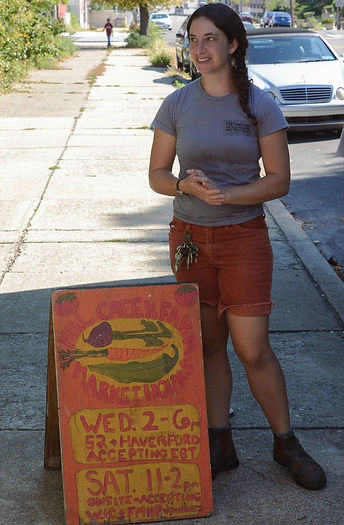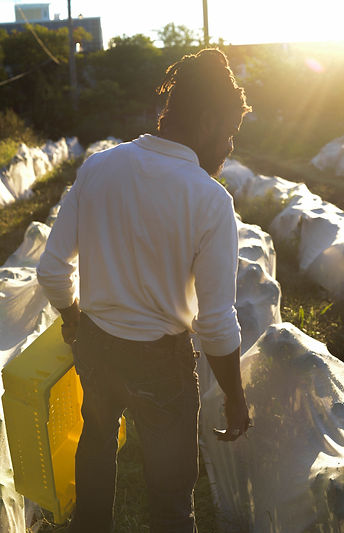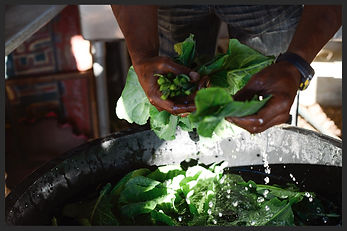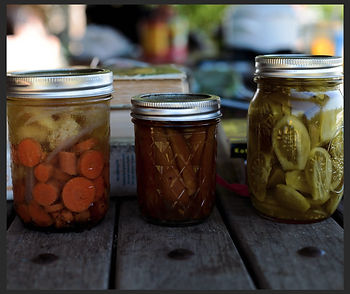
Head farmer of Mill Creek Farm, Micaiah Hall, discusses the importance of local produce and the impact it has on the community. | Harrison Brink and Maggie Andresen
It’s a golden morning in West Philadelphia, and the sun hits the plants at Mill Creek Farms with warm nourishment. The surrounding area is quiet, as if one is far from urban living. Fresh dew scents the air, and through the gates of Mill Creek is a farmer preparing for the day ahead.
“It’s a process, you have to have a level of humility to work as a farmer.”
Micaiah Hall is as much a part of Mill Creek Farms as the vegetables he tends to. Though he has been actively working with the farm for only two seasons, Micaiah has been involved with urban agriculture for more than ten years. He is thirty-six, but after years of daily labor and close contact with the land, Micaiah looks and moves like a man ten years his junior. He tears off the mesh cloth protecting his collard greens from nighttime critters, cutting the kale by its root and lumping it into a large basket.
“You’ve got to cut away the old for rebirth and new life,” he says as he tends to the greens. This is Micaiah’s life mantra.
Micaiah began farming with his father at the age of twelve in his home state of Connecticut. After high school he learned plumbing at a trade school, making good money doing it.
“It’s pretty clear I’m not in this for the money, if I wanted money I’d still be working as a plumber. It’s a process, you have to have a level of humility to work as a farmer.”
In 1998, Micaiah began working in Atlanta building community houses. It was there he linked with urban farmers in the area, fascinated by the traditionally rural practice of agriculture being practiced in urban centers.
“On a health level, it’s good to have local produce. Food that hasn’t traveled hundreds of miles or touched hundreds of hands, and has adapted to the environment you live in. It’s almost like a natural vaccination, because these plants find ways to deal with the toxins in the air and the water and the environment and still be healthy. And it’s the same air you breathe and the same water you splash on you so when you eat those plans you build yourself the same way.”
Mill Creek Farms doesn’t have an organic certification; it’s considered ‘chemical-free’, a higher level than organic- which allows for numerous chemicals to be used in the growing process.

"There is no culture without agriculture."

Labeled as a non-profit, Mill Creek is considered an Educational Farm. Micaiah provides in and out of school curriculum for local high schools, after school programs in nutrition, and interactive cooking demonstrations. Apprenticeship programs are offered for students with difficult economic situations who have come to love the Mill Creek experience but would be unable to volunteer without supplementary funds.
A variety of vegetables can be found at Mill Creek today; dinosaur kale, red Russian kale, Swiss chard, mustard greens, potatoes, winter squash, butternut squash, hot peppers, sweet peppers, eggplant, tomatoes, zucchini, basil, cilantro, scallions, okra, green beans, and string beans are the crops signaling the end of the summer season and introduction to fall and winter crops. Micaiah maintains that the ability to navigate how food reacts to your body will make it easy to take care of your own body.
“Different vegetables and greens are better for different people, it’s like a medicine cabinet, is chard or kale better for the way you move? Everything your body needs is in the ground.”
Mill Creek serves the larger purpose as an oasis in the urban food desert. Places to procure fresh produce are located miles away, that access is difficult when one’s economic situation isn’t ideal.
Farmers markets and urban farms have been able to curve that. Escaping the concrete jungle and get one’s hands in the dirt can be incredibly therapeutic; it also helps that Mill Creek accepts many forms of support currency in order to encourage local communities to try fresh produce. The farm accepts Philly food bucks, access cards, FNNP checks, and senior citizen checks. Mill Creek also donates hundreds of pounds of food to churches, emergency centers, and soup kitchens.
Micaiah now acts as mentor after years of being the student of more experienced farmers. With the privilege of knowledge comes the responsibility to pass that learning on to those willing to accept it, and Micaiah has every wish to pass on his wisdom. The practice of urban farming, he says, must be passed through teaching the city youth how to farm. In this way the practice will be sustained as they adapt a relationship with nature and feel connections to the food they grow and the community they serve.
“The children are our seeds, just like the garden you have to nurture the seeds, water them, weed them, cut back the bad and encourage the good to grow.”
- Maggie Andresen
Aviva Asher sets up the Saturday morning farm stand outside of Mill Creek's parameters, an ideal setting for local members of the community to buy their fresh produce. September 27, 2014. | Maggie Andresen
Aviva Asher sets up the Saturday morning farm stand outside of Mill Creek's parameters, an ideal setting for local members of the community to buy their fresh produce. September 27, 2014. | Maggie Andresen

Collard greens are very popular with the Mariposa food co-op Mill Creek works with. More unattractive greens with equal nutritional value are given to soup kitchens by Micaiah. September 27, 2014. | Maggie Andresen

A variety of pickled vegetables and fruits were on display before the pickling demonstration on September 27, 2014. Most Saturday morning markets include a cooking demonstration. | Maggie Andresen

















